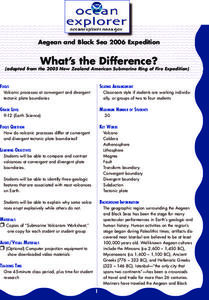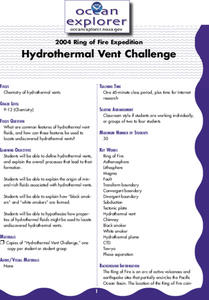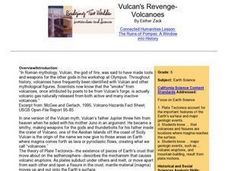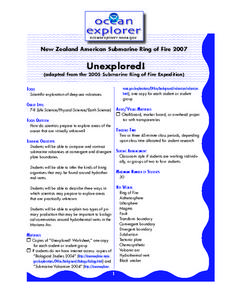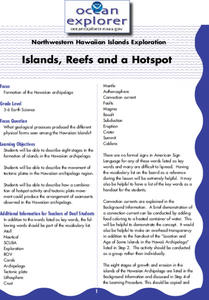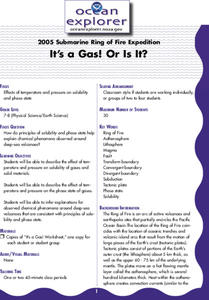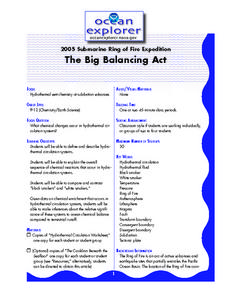Curated OER
What's the Difference?
Students investigate volcanic processes at convergent and divergent
tectonic plate boundaries. They read and analyze diagrams, complete a worksheet, and write an essay.
Curated OER
Hydrothermal Vent Challenge
Students discover common features of hydrothermal vent fluids. They use this knowledge to locate possible undiscovered hydrothermal vents on the ocean floor.
Curated OER
My Friend, The Volcano
Young scholars describe the positive impacts of volcanic activity on marine ecosystems. In this volcano lesson plan students explore the process that causes volcanic activity along the Mariana and Kermadec Island Arcs.
Curated OER
Volcano!-Thar She Blows!
Middle schoolers describe how volcanoes are formed. They name the types of boundaries where volcanoes occur. They utilize models to illustrate the occurence of volcanoes and earthquakes along plate boundaries. They compare and constrast...
Curated OER
It's a Gas! Or is it?
Young scholars describe the effects of temperature and pressure on solubility of gases and other materials. In this investigative lesson students read an article and answer questions about it.
Curated OER
Vulcan's Revenge-Volcanoes
Sixth graders research various types of volcanoes. They explore the various emissions that come from them. Offer some explanation why some erupt by "quietly" puring lava, while others blast out chunks of rock and clouds of ash and gases.
Curated OER
It looks Like Champagne
Students interpret phase diagrams and explain the meaning of vocabulary words. In this ocean explorer lesson students describe two uses of super-critical carbon dioxide.
Curated OER
2005 Submarine Ring of Fire Expedition: What's for Dinner?
Students compare and contrast photosynthesis and chemosynthesis as sources of primary production for biological communities, and describe sources of primary production observed in biological communities associated with volcanoes of the...
Curated OER
Where There's Smoke......
High schoolers use fundamental relationships between melting points, boiling points, solubility, temperature and pressure to develop explanations. In this chemistry lesson students complete an activity.
Curated OER
Unexplored!
Students explore volcanoes. In this deep sea volcano lesson students complete a worksheet and various activities.
Curated OER
A Hydrothermal Adventure
Students analyze hydrothermal vents. For this hydrothermal vents lesson, students discover the effects of hydrothermal vents on tectonic plates. Students make model hydrothermal vents to understand how they form and operate.
Curated OER
Islands, Reefs, and a Hotspot
Students describe eight stages in the formation of islands in the Hawaiian archipelago. They examine the movement of tectonic plates in the Hawaiian archipelago region, and describe how plate movement produced the Hawaiian archipelago.
Curated OER
It's a Gas! Or is it?
Learners discover the principles of solubility and phase state and their influence on chemical phenomena observed around deep-sea volcanoes. They describe the effect of temperature and pressure on solubility of gasses and solid materials.
Curated OER
The Big Balancing Act
Students describe chemical changes occurring in hydrothermal circulation systems. They make inferences about the significance of these systems to ocean chemical balance compared to terrestrial runoff.
Curated OER
It Looks Like Champagne
Students determine some practical implications of the discovery of liquid carbon dioxide in deep-ocean ecosystems. They interpret phase diagrams and explain the meaning of "critical point" and "triple point."
Curated OER
Where to Live?
Students examine types of spatial data found in a GIS. In this geography lesson students use a GIS to facilitate analysis and decision making.


